David Tickner's Blog, page 27
November 5, 2021
Acronym
 What do the following words have in common? AIDS, asap, canola, Canora, fubar, jeep, ichthys, IKEA, Jehovah, JPEG, laser, Pakistan, radar, scuba, SIM, snafu, sonar, SWAT, WAIT.
What do the following words have in common? AIDS, asap, canola, Canora, fubar, jeep, ichthys, IKEA, Jehovah, JPEG, laser, Pakistan, radar, scuba, SIM, snafu, sonar, SWAT, WAIT.All these words are acronyms; i.e., a short cut or shorthand way of condensing a long phrase. An acronym is formed from the first letters of a series of words in a phrase and is seen and pronounced as a single word. Acronyms are not to be confused with ‘initialisms’ which are pronounced letter by letter, not as words; e.g., lol, btw, TGIF, CBC, UBC, and so on—none of these initialisms make a pronounceable word.
Acronyms were almost unknown before the 20th century. The word acronym, from 1943, combines acro from the Proto-Indo-European (PIE) root ak (to be sharp, to rise to a point, to pierce) + nym (from the PIE root no-men = name). In brief, an acronym is a way of ‘getting to the point’ of a long phrase and giving it a ‘name’.
There are hundreds of acronyms. Here are the long forms of the acronyms listed above with the dates they appeared:
AIDS 1983. Acquired Immune Deficiency Syndrome, named at the Pasteur Institute, France.
asap 1955. As Soon As Possible. US Army slang.
Canola 1970s. CANada Oil Low Acid.
Canora, SK 1908. CAnadian NOrthern Railway.
fubar 1944. F**ked Up Beyond All Repair. US Army slang.
jeep 1941. A General Purpose US military vehicle; General Purpose = GP = jeep.
ichthys 1st century CE. The Greek word for fish. Used in the early Christian church as a mnemonic for I esous Ch ristos Th eou Y ios S oter (Jesus Christ Son of God Savior)
IKEA 1943. I ngvar K amprad (the founder) + E lmtaryd (his farm) + A gunnaryd (his village). Pronounced ‘ee-kay-uh’ if you are Swedish.
Jehovah 1530. To English from Latin JeHoVa, a 1516 transliteration of Hebrew YHWH (Yahweh) by European theology students.
JPEG 1986. Joint Photographic Experts Group
Laser 1958. Light Amplification by Stimulated Emission of Radiation.
Pakistan 1933. From the names of the five northern regions of the pre-1947 Partition of India: P unjab, A fghania, K ashm i r, S indh, Baluchis tan .
Radar 1940. RAdio Detection And Ranging.
Scuba 1954. Self-Contained Underwater Breathing Apparatus.
SIM 1991. SIM card: Subscriber Identification Module.
Snafu 1942. Situation Normal. All F**ked Up. US Army slang.
Sonar 1930s. SOund Navigation And Ranging.
SWAT 1964. Special Weapons And Tactics.
WAIT 1972. WAIT time; i.e., a guideline for teachers: Why Am I Talking?
What about the word okay?
Some sources say it is an acronym. Others say it is just another word. Okay can be both a noun (first seen in 1841: e.g., “The boss will give you her okay on that.”) and a verb (first seen in 1888: e.g., “I’ll okay that for you once the paperwork is done”) as well as both an adverb and an adjective. Wikipedia indicates several origins of ‘okay’ and at least 25 or more variations of ‘okay’ including its use in several languages; e.g., okei in some Scandinavian languages, okej in some Balkan languages, oukei in Afrikaans, oke in Vietnam, and many others including Ned Flanders’ use of “Okily dokily.”
https://en.wikipedia.org/wiki/OK
Etymology of OK: https://www.youtube.com/watch?v=1UnIDL-eHOs&ab_channel=Vox
Reference: Online Etymological Dictionary, https://www.etymonline.com/
https://en.wikipedia.org/wiki/Acronym
Published on November 05, 2021 21:22
November 3, 2021
Snot
 The humble and lowly word snot has hardly changed at all over hundreds, even thousands, of years. Snot has always been snot. It is part of everyone’s life. Snot is not a pretentious or a high-falutin word—it is an ordinary everyday down-to-earth member of the English language family with a long and unassuming history of simply doing its daily work.
The humble and lowly word snot has hardly changed at all over hundreds, even thousands, of years. Snot has always been snot. It is part of everyone’s life. Snot is not a pretentious or a high-falutin word—it is an ordinary everyday down-to-earth member of the English language family with a long and unassuming history of simply doing its daily work.Snot has its origins in Proto-Germanic snuttan, the source of Old Frisian snotta, Middle Dutch snotte, Middle Low German snute, and Old English gesnot (nasal mucus). Old English also had a verb, ‘to snite’, i.e., to wipe or pick one’s nose. The word snot appears in English in the late 14th century.
So, there you go. Just in case anyone asks. Or in case you run out of things to talk about at a dinner party.
“Incidentally,” writes Bill Bryson, “the reason your nose runs in chilly weather is the same reason your bathroom windows run with water in chilly weather. In the case of your nose, warm air from your lungs meets cold air coming into the nostrils and condenses, resulting in a drip” (Bryson, 213). So, in this case, just to be clear, it snot snot, it’s condensation.
Reference: Online Etymological Dictionary, https://www.etymonline.com/
Bryson, Bill. (2021). The Body: A guide for occupants. Toronto: Anchor Canada.
Published on November 03, 2021 19:32
October 29, 2021
Ambivalence
 You might think that ambivalence means wishy-washy or indecisive or whatever. But, no, it means quite the opposite.
You might think that ambivalence means wishy-washy or indecisive or whatever. But, no, it means quite the opposite.The word ambivalence has its origins in words meaning strength; in particular, in the Proto-Indo-European (PIE) root wal (to be strong) and later in Latin valere (to be strong) and valentia (strength, vigor).
The word ambivalence is a 20th century word. In 1901, the Swiss psychologist Eugen Bleuler coined the word Ambivalenz (based on the model of German Equivalenz; i.e., equivalent) which was created from Latin ambi (both, on both sides) + valentia; i.e., to be strong on both sides. The word ambivalence came to English in 1924 meaning ‘simultaneous conflicting feelings.’
The adjective ambivalent was in general use in English by 1929 and meant ‘having simultaneously conflicting feelings or contradictory ideas about an object, person, or action’. Originally the word was a term from psychology but has since taken on a broader literary and general sense.
Other words based on the PIE root wal (to be strong) include avail, convalesce, evaluation, invalid, prevalent, valediction, valiance, valid, value, and wield.
For a dramatic example of the use of the word ambivalent, check out this ~3.5 minute video clip which was brought to my attention by a colleague. From the 1999 movie, Girl, Interrupted: https://www.youtube.com/watch?v=pvNA2JkMfSI
Image: Association for Psychological Science
Reference: Online Etymological Dictionary, https://www.etymonline.com/
Published on October 29, 2021 10:43
October 26, 2021
Stupid
 I confess to a lifetime of misunderstanding the word stupid. To me, as a teacher, ‘stupid’ was a derogatory term that seemed to imply not so much a person’s lack of intelligence as much as the apparent unwillingness of the person to use their intelligence or their apparent unthinking and complacent residence in ignorance.
I confess to a lifetime of misunderstanding the word stupid. To me, as a teacher, ‘stupid’ was a derogatory term that seemed to imply not so much a person’s lack of intelligence as much as the apparent unwillingness of the person to use their intelligence or their apparent unthinking and complacent residence in ignorance.In contrast, I learned to my surprise that the word stupid is not related to intelligence or lack of intelligence at all. Rather, the word stupid has its origins in the PIE root (s)teu-1 (to push, stick, knock, beat) and PIE stupe (hit); i.e., to be stupid was to be struck senseless, to be in a stupor.
From this PIE root comes Latin stupere (to be stunned, amazed, confounded) and stupidus (amazed, confounded; dull, foolish). The word stupid (mentally slow, lacking ordinary activity of mind, dull, inane) only came to English in the 1540s. 1
Today, the Merriam-Webster Dictionary defines stupid using words such as obtuse, brutish, torpid, senseless, vexatious, and exasperating.
I recently came across a short six-minute video based on part of Dietrich Bonhoeffer’s book, Letters and papers from prison, which helped me put stupidity in a larger context. In brief, Bonhoeffer suggests that stupidity in its darkest forms is not so much an intellectual defect as a moral defect and that stupidity is not so much a psychological problem as a sociological problem. A stupid person is not only undisturbed by facts or reason or appeals to emotion but, more seriously, a stupid person cannot tell the difference between good and evil and, as such, is a danger to themself and to others. 2
Reference: Online Etymological Dictionary, https://www.etymonline.com/
https://www.merriam-webster.com/dictionary/stupid
1 Note that this was the time of the Protestant Reformation in Western Europe. Perhaps, at this time, people were considered ‘stupid’ who did not believe the same things that you believed.
2 Bonhoeffer’s theory of stupidity (six-minute video)
https://www.youtube.com/watch?v=ww47bR86wSc&ab_channel=Sprouts
Published on October 26, 2021 17:22
October 23, 2021
Ultracrepidarian
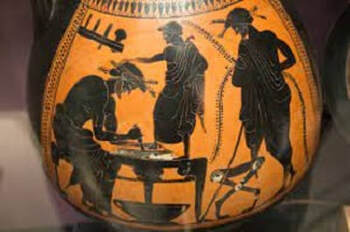 Do you know any ultracrepidarians? And, no, such people are not members of some obscure cult.
Do you know any ultracrepidarians? And, no, such people are not members of some obscure cult.Here’s a story: A famous painter named Apelles lived in ancient Greece. One day a shoemaker pointed out a defect in Apelles’ depiction of a sandal in a painting. Apelles duly corrected the mistake. The shoemaker, now feeling encouraged, began to point out other defects in the painting to which Apelles cuttingly replied that the shoemaker should not make judgments ‘beyond the sandal’; i.e., stick to what you know—sandals.
The ancient Greek word for sandal was krepis; in Latin crepida. The Latin phrase ultra crepidam literally means ‘beyond the sandal’. However, over time, ultra crepidam became an expression meaning ‘don’t make judgments about something that you don’t know anything about.’
Eventually the term ultracrepidarian referred to a presumptuous person who has no special knowledge of a subject but who expresses a strong opinion or advice about it anyway.
For a short overview of the contemporary research on this personality trait, check out this five-minute TED-Ed talk on the Dunning-Kruger Effect:
Why incompetent people think they’re amazing.
https://www.youtube.com/watch?v=pOLmD_WVY-E&ab_channel=TED-Ed
You may have seen or run into such people every now and again.
Image: A 5th century BCE Athenian shoemaker cuts a piece of leather round the foot of customer.
Ashmolean Museum, Oxford. Athenian black-figure pottery pelike, 5th century BC
https://commons.wikimedia.org/wiki/File:Athenian_black-figure_pelike,_5th_c_BC,_shoemaker,_AshmoleanM,_AN_1986-1908_G.247,_142573.jpg
Reference: Online Etymological Dictionary, https://www.etymonline.com/
https://www.merriam-webster.com/words-at-play/polite-words-for-impolite-people/ultracrepidarian
https://en.wikipedia.org/wiki/Sutor,_ne_ultra_crepidam
Published on October 23, 2021 21:54
October 20, 2021
Solastalgia
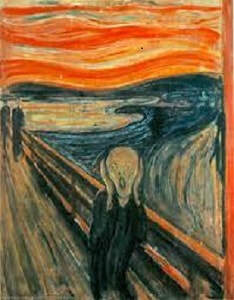 Are you getting tired of Covid? Have you heard others or your self ask, “When is life going to get back to ‘normal?” Or, why can’t things just be like they used to be? Or, do you feel anxious or concerned about what the ‘new normal’ might bring?
Are you getting tired of Covid? Have you heard others or your self ask, “When is life going to get back to ‘normal?” Or, why can’t things just be like they used to be? Or, do you feel anxious or concerned about what the ‘new normal’ might bring?There’s a word for this feeling or sensation: solastalgia. And it is not just related to Covid.
The word solastalgia was created in 2003 by Glenn Albrecht, an environmental philosopher and professor of sustainability and environmental studies in Australia. The word solastalgia is a combination of Latin solacium (comfort, solace) and the Greek root algia (pain, suffering, grief).
Solastalgia, as defined by Albrecht, is a form of psychic or existential distress (emotional, mental, spiritual, physical) that people experience when the world around them is being transformed by forces beyond their control. People respond to such distress in many ways: fear or anger, despair or denial, or perhaps by finding ways to work together in order to take responsibility for doing something about it.
In brief, solastalgia is the sense of loss of solace and comfort in your home environment. In contrast, nostalgia is the homesickness felt when you are away from your home environment.1
Perhaps another pandemic we are experiencing today is not just Covid but solastalgia?
Other words with -algia include fibromyalgia (muscle pain), neuralgia (the pain of damaged nerves), nostalgia (the pain of homesickness)2.
Reference: Online Etymological Dictionary, https://www.etymonline.com/
Robert Macfarlane. (2019). Underland: A deep time journey. London: Penguin.
TEDxSydney - Glenn Albrecht - Environment Change, Distress & Human Emotion Solastalgia
https://en.wikipedia.org/wiki/Solastalgia
David’s Wordshop Blog: http://www.davidtickner.ca/blog
www.davidtickner.ca
1 Albrecht compares solastalgia to nostalgia and suggests that it is distinctive kind of nostalgia or homesickness. As described by Macfarlane, “Where the pain of nostalgia arises from moving away, the pain of solastalgia arises from staying put. Where the pain of nostalgia can be mitigated by return, the pain of solastalgia tends to be irreversible … solastalgia speaks of how a familiar place is rendered unrecognizable by climate change or corporate action” (Macfarlane, 317).
2 Nostalgia, from 1726, was a medical term first defined as the morbid longing to return to one’s home or native country. For example, during the American Civil War, there were reported 2588 cases of nostalgia, and 13 deaths attributed to this cause.
Today, nostalgia is a more benign condition. Merriam-Webster defines nostalgia as pleasure and sadness that is caused by remembering something from the past and wishing that you could experience it again; or a wistful or excessively sentimental yearning for return to some past period or irrecoverable condition.
Published on October 20, 2021 10:00
October 17, 2021
Hobby
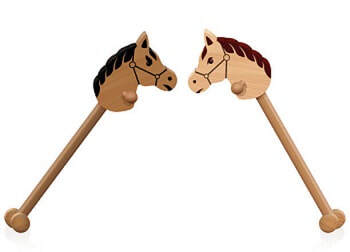 Did you have hobbies when you were a child? Do you still have hobbies?
Did you have hobbies when you were a child? Do you still have hobbies?Do you like the word hobby? Would you prefer a different word? Avocation? Craft? Obsession? Pastime? Hobbies are often perceived as not serious; e.g., his collection of hockey cards is ‘just a hobby’.
Where does the word hobby come from?
Hobby come to English around 1400 as hobi or hobyn (a small, active horse) and was probably a proper name given to a playful or lively horse in the way we’d name a pet dog or cat. A related name was dobbin, a nickname or short form of Robert or Robin. Perhaps the names ‘hobby’ and ‘robby’ have similar origins?
By the 1550s, a hobbyhorse was a wickerwork figure of such a small active horse was worn as a costume (a ‘morris horse’) and was part of the ancient English morris-dance tradition. A morris-horse was a horse that didn’t go anywhere—it was just for fun. These mock horses were also part of church and civic celebrations at Midsummer and New Year throughout England.
By the 1580s, a hobbyhorse, a crafted horse’s head on the end of a stick, referred to a child’s toy riding horse. Today, these toys are called ‘stick horses’.
The idea of a hobby, a shortening of hobbyhorse, as a favorite pursuit (often for relaxation) is from 1816. The word hobbyist, someone devoted to some pursuit simply for the delight of it, is from 1830. At this time during the early 19th century, perhaps more and more people began to have the leisure time for ‘hobbies’ in contrast to the demands of daily life for most people in previous times.
Reference: Online Etymological Dictionary, https://www.etymonline.com/
Published on October 17, 2021 13:54
October 13, 2021
Almanac
Do you know anyone who has used an almanac? As a child, I vaguely remember seeing copies of the Old Farmer’s Almanac on a table or shelf when I would be playing at a friend’s home. Later I wondered how such a magazine could predict the weather and other events months in advance. Consulting an almanac seemed sort of like consulting your horoscope.
What is an almanac, anyway? Merriam-Webster tells us that an almanac is “a publication containing astronomical and meteorological data for a given year and often including a miscellany of other information; usually an annual publication containing statistical, tabular, and general information.”
The origins of the word almanac are obscure and the subject of much speculation. The word came to English in the late 14th century from Old French almanach and Latin almanachus, meaning a book of permanent tables of astronomical data.
Some suggest that the word is from Arabic al-manakh (calendar, almanac) or perhaps from Greek almenichiakon (calendar). The Online Etymological Dictionary suggests that “the word almanac was pseudo-Arabic and was generated within a circle of astronomers in Paris in the mid-13th century” (https://www.etymonline.com/search?q=almanac).
What is not uncertain is that scholars in Islamic universities during the 6thth to 13th centuries pioneered developments leading to modern astronomy, including the development of algebra and trigonometry to measure and record the movements of the stars and planets.
Reference: Online Etymological Dictionary, https://www.etymonline.com/
https://astronomy.com/news/2017/02/muslim-contributions-to-astronomy
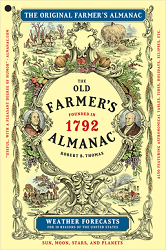
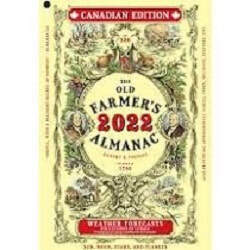
What is an almanac, anyway? Merriam-Webster tells us that an almanac is “a publication containing astronomical and meteorological data for a given year and often including a miscellany of other information; usually an annual publication containing statistical, tabular, and general information.”
The origins of the word almanac are obscure and the subject of much speculation. The word came to English in the late 14th century from Old French almanach and Latin almanachus, meaning a book of permanent tables of astronomical data.
Some suggest that the word is from Arabic al-manakh (calendar, almanac) or perhaps from Greek almenichiakon (calendar). The Online Etymological Dictionary suggests that “the word almanac was pseudo-Arabic and was generated within a circle of astronomers in Paris in the mid-13th century” (https://www.etymonline.com/search?q=almanac).
What is not uncertain is that scholars in Islamic universities during the 6thth to 13th centuries pioneered developments leading to modern astronomy, including the development of algebra and trigonometry to measure and record the movements of the stars and planets.
Reference: Online Etymological Dictionary, https://www.etymonline.com/
https://astronomy.com/news/2017/02/muslim-contributions-to-astronomy


Published on October 13, 2021 08:11
October 9, 2021
Thanksgiving

Happy Thanksgiving!
Happy Thanksgiving!
The word thanksgiving is straight forward and unchanging in its origins and meanings. People have always had experiences for which thankfulness is the response. How interesting and how humbling, how down to earth, to have a public holiday based on giving thanks.
Thank
The word thank has its origins in the ancient Proto-Indo-European (PIE) root tong (to think, to feel); that is, thinking or being mindful of feeling; particularly feelings of gratitude. From PIE tong comes Proto-Germanic thankojanan and thankoz (thought, gratitude), words which are the origin of others such as Old Saxon thancon, Old Frisian thankia, Old High German danchon, Middle Dutch, Dutch, and German danken—all meaning ‘to thank’. You can see (and hear) the origins of the English word ‘thank’ in these words. People of the Indo-European language family have been saying “Thank You” and expressing gratitude using almost the same sounds or words for thousands of years.
To say ‘thank you’ is an act of intention—a purposeful pause and expression of thanks and gratitude.
Give, giving
The word give comes from the PIE root ghabh which meant both to give and to receive, like the two sides of a coin. We receive something and we give thanks. When we give thanks, we give someone something to receive. If nothing else, we give our gratitude. Like the word thanks, the word give has not changed that much over the centuries.
Thanksgiving
The word thanksgiving appears in English in the 1530s.
In Canada, the first record of a ‘thanksgiving’ meal is from 1578 when the explorer Martin Frobisher gave thanks for safe arrival in the Arctic at what is now known as Iqaluit. Before Thanksgiving became an official Canadian holiday in 1957, Thanksgiving was celebrated at various times as part of harvest festivals and other celebrations. Thanksgiving is now celebrated across Canada on the second Monday of October each year.
The first American Thanksgiving was held by the Plymouth Colony Pilgrims in 1621. The holiday, now celebrated on the fourth Thursday of November, is from the 1670s and recognizes the support given to early colonists by indigenous peoples. Ironically, the first Thanksgiving in 1621 was attended by more indigenous people than colonists! https://en.wikipedia.org/wiki/Thanksgiving_(United_States)
How often do newcomers continue to recognize and give thanks to indigenous peoples for the initial support given to early colonists and traders?
What can newcomers learn today from indigenous traditions of giving thanks and gratitude for life and for the land on which we all live?
New perspectives—yet another reason for feeling gratitude and giving thanks.
Happy Thanksgiving, everyone!
Reference: Online Etymological Dictionary, https://www.etymonline.com/
Kimmerer, R.W. (2013). Allegiance to gratitude. In R.W. Kimmerer, Braiding sweetgrass: Indigenous wisdom, scientific knowledge, and the teachings of plants. Minneapolis, MN: Milkweed, 105 – 117.
Published on October 09, 2021 12:12
October 6, 2021
Grove
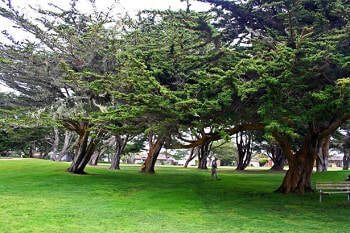 When you walk through a grove of trees, consider that the word grove has been part of English for centuries; however, no one knows where the word came from.
When you walk through a grove of trees, consider that the word grove has been part of English for centuries; however, no one knows where the word came from.The word grove first appears in records of the late 9th century as Old English graf (a grove, a copse, a small wooded area without underbrush) and is related to Old English graefa (thicket). Before this the origins are unknown. There is no record the word grove in any other Germanic language. This might suggest that the word grove has its origins in the language of the original pre-Germanic inhabitants of what is now England—but who knows?
A notable use of the word grove is related to the word academy. In brief, Plato lived in Athens near a grove of olive trees in which he would walk and talk with his students and followers.1 The grove was called Akademos and, in Latin, was known as the Academia (the grove of Akademos). By the mid-15th century, the word Achademie is seen in English as the translation from Latin of the name of the public garden or grove in which Plato’s school was located. Later, achademie, then academy, meant a private school and over time became a generic term for higher education.
What about the name Grover? Notably one of the characters on Sesame Street. In English, the name Grover means someone who lives near a grove. In German, a grover is a ditch digger or grave digger (). The word grover does not in a dictionary other than as a surname.
Reference: Online Etymological Dictionary, https://www.etymonline.com/
1 Legends from ancient Greece tell the story of this olive grove which had been presented by the Spartans to the Athenian hero Achilles for his efforts in helping to rescue (or to return) Helen of Troy to the Spartans after the Trojan War. Helen, a Spartan queen who had either been abducted or who had eloped (depending on what version of the story you read) is known to history as ‘the face that launched a thousand ships.’
Published on October 06, 2021 11:55



